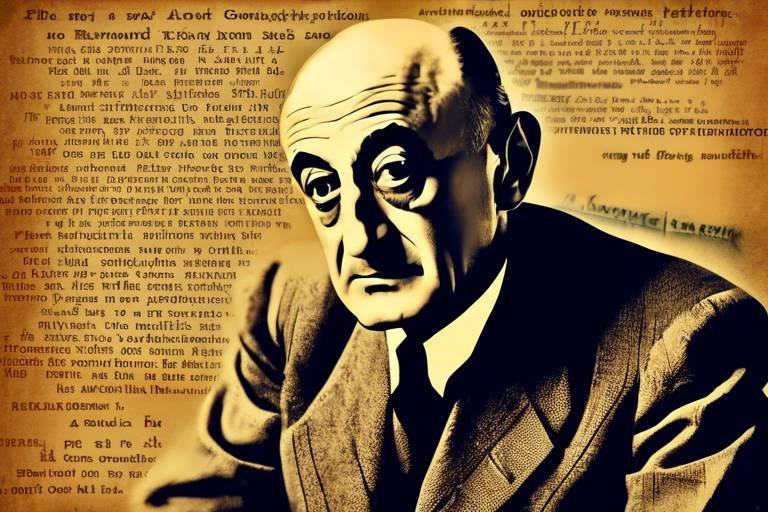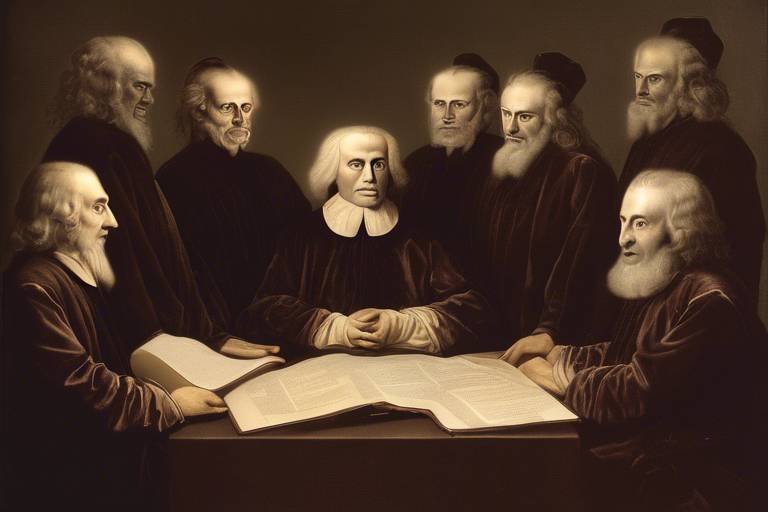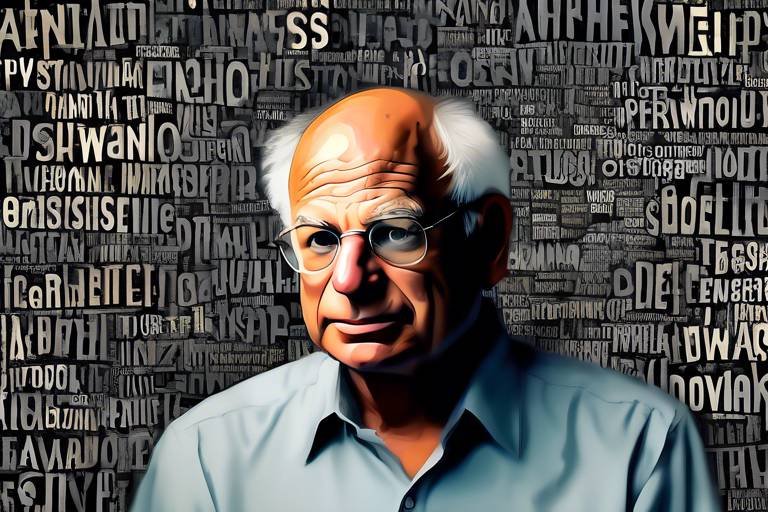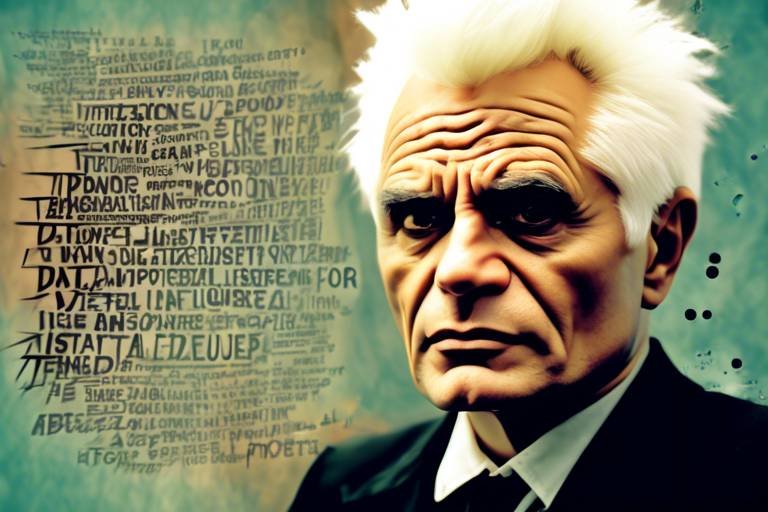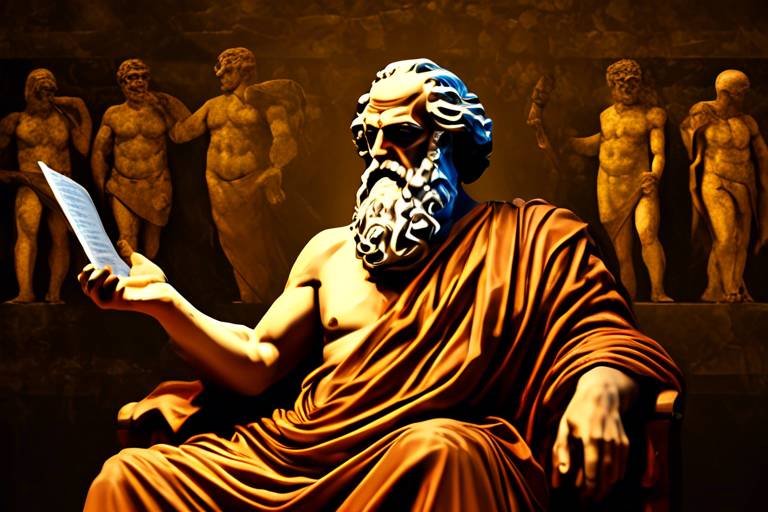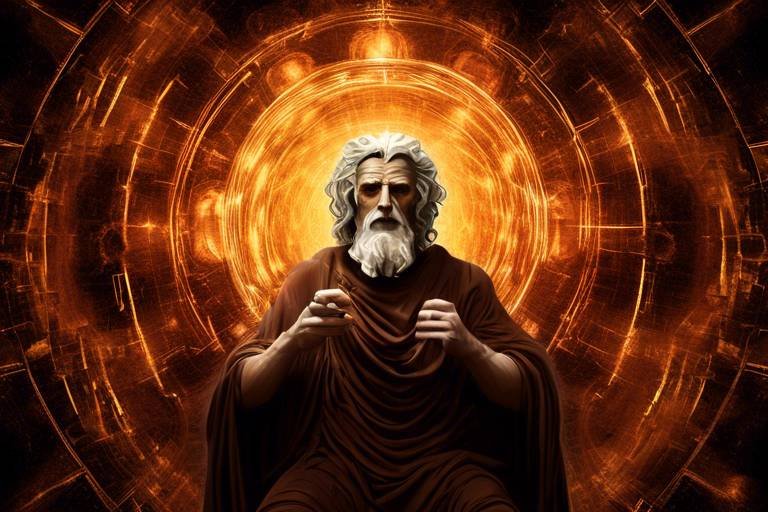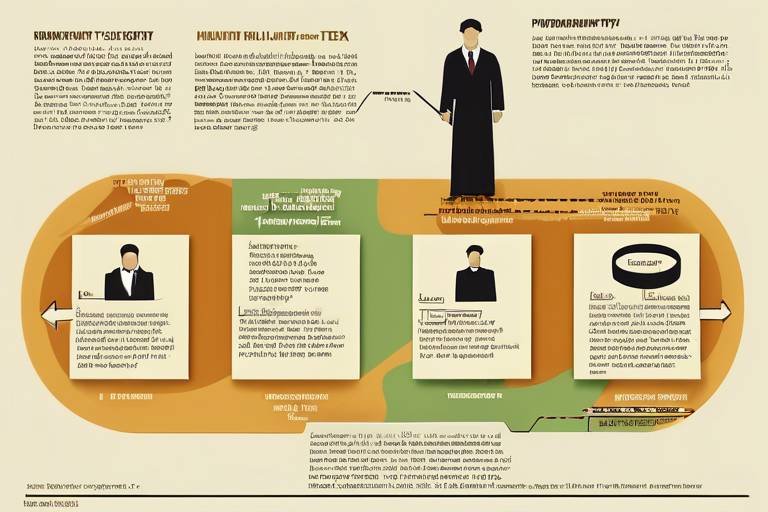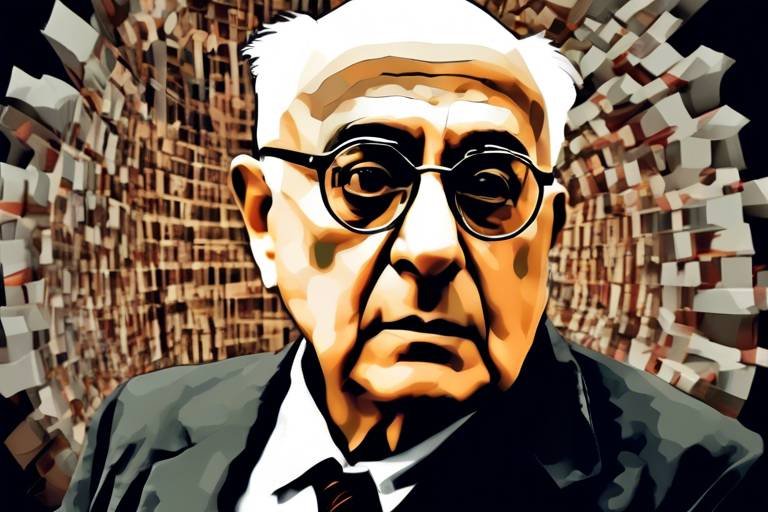Philosophical Contributions of Raymond Aron: A Review
Raymond Aron, a prominent French philosopher, sociologist, and political scientist, has made significant contributions to our understanding of modern society and its complexities. His work transcends traditional boundaries, weaving together threads of sociology, political philosophy, and ethics to create a rich tapestry of thought that resonates even today. In a world where the pace of change is relentless, Aron's insights provide a critical lens through which we can examine the nature of modernity and its impact on individual and collective experiences. This article delves into his profound ideas, exploring how they shape contemporary discourse and why they remain relevant in our quest for understanding the intricate dynamics of human behavior and societal evolution.
Raymond Aron critically analyzed modernity, emphasizing its complexities and contradictions. He viewed modernity not just as a linear progression of events but as a multifaceted phenomenon that shapes both individual and collective experiences. Aron argued that modernity brings with it a myriad of challenges, including the tension between tradition and progress, individualism and collectivism, and freedom and constraint. By dissecting these contradictions, he illuminated how modernity influences societal structures and thought processes, urging us to grapple with the implications of living in an increasingly interconnected world.
Aron’s work in sociology offered a unique lens to understand social dynamics. He believed that sociology is not merely a collection of statistics or trends but a vital discipline that enriches philosophical inquiries. By integrating sociological insights into his philosophical framework, Aron deepened discussions on human behavior and societal evolution. He posited that understanding the social context is essential for grasping the complexities of individual actions and societal changes, thereby bridging the gap between abstract philosophical concepts and tangible social realities.
Aron examined the intricate relationship between individuals and society, arguing that personal choices are profoundly influenced by social contexts. This interplay is crucial for understanding human agency and social responsibility. He suggested that while individuals possess the capacity for free will, their decisions are often shaped by cultural norms, economic conditions, and historical circumstances. In this way, Aron’s philosophy compels us to reflect on how our identities and choices are intertwined with the broader social fabric, urging a more nuanced understanding of autonomy and accountability.
Aron posited that social structures can both constrain and enable individual freedom. His analysis encourages a nuanced view of how societal norms impact personal autonomy. For instance, while certain social structures may impose limitations on individual choices, they can also provide essential frameworks that facilitate personal development and community engagement. This duality highlights the importance of recognizing the potential for both oppression and liberation within societal constructs, prompting a deeper exploration of how we navigate our freedoms in relation to the world around us.
Understanding Aron's contributions requires exploring the historical backdrop of sociological thought. His work reflects the intellectual currents of his time, bridging classical and contemporary sociological theories. By situating his ideas within this historical context, we can better appreciate how he synthesized various philosophical traditions to address the pressing issues of his era. This synthesis not only enriched his theoretical framework but also provided a foundation for future sociological inquiries, paving the way for new perspectives on the human condition.
Aron’s political philosophy emphasizes the importance of ethics in political decision-making. He argued for a pragmatic approach that considers moral implications alongside political realities. In a world often fraught with moral dilemmas, Aron’s insistence on the ethical dimensions of politics serves as a reminder that decisions should not be made in a vacuum. Rather, they should reflect a commitment to justice, equity, and the common good, challenging us to think critically about the values that underpin our political systems.
Aron was a vocal critic of totalitarian regimes, advocating for liberal democracy. His insights into the dangers of authoritarianism remain relevant in today's political landscape, prompting discussions on freedom and governance. He highlighted how totalitarianism undermines individual rights and stifles dissent, warning against the seductive allure of absolute power. In an age where many societies grapple with issues of governance and liberty, Aron's critiques serve as a powerful reminder of the importance of safeguarding democratic principles and fostering an environment where diverse voices can be heard.
Aron's analysis of the balance of power in international relations highlights the necessity of diplomacy and cooperation. He argued for a pragmatic approach to global politics, emphasizing stability over ideological conflicts. By advocating for a balance of power, Aron underscored the importance of strategic alliances and negotiations in maintaining peace. His perspective encourages us to consider the complexities of international relations and the role of diplomacy in navigating an increasingly interconnected world.
Raymond Aron’s ideas continue to influence contemporary political thought, particularly in discussions about democracy, freedom, and the role of the state in individual lives. His legacy endures through ongoing debates in political philosophy, reminding us that the questions he raised are as pertinent today as they were in his time. As we confront new challenges in governance and social dynamics, Aron's work provides a valuable framework for understanding the interplay between individual rights and collective responsibilities.
- Who was Raymond Aron? Raymond Aron was a French philosopher, sociologist, and political scientist known for his contributions to modern sociology and political philosophy.
- What are the main themes in Aron's work? His work primarily focuses on modernity, the interaction between individual and society, political ethics, and the critique of totalitarianism.
- How does Aron's philosophy relate to contemporary issues? Aron's insights on democracy, governance, and individual freedom remain relevant as societies navigate complex political landscapes today.
- What is Aron's stance on totalitarianism? Aron was a strong critic of totalitarian regimes, advocating for liberal democracy and emphasizing the importance of individual rights.

Aron's View on Modernity
This article explores the significant philosophical contributions of Raymond Aron, focusing on his insights into sociology, politics, and the nature of modernity, while examining their relevance in contemporary discourse.
Raymond Aron had a profound understanding of modernity, a term that encapsulates the complexities and contradictions of contemporary life. He didn't just accept modernity at face value; instead, he delved deep into its layers, revealing how it shapes both individual and collective experiences. For Aron, modernity was not merely a backdrop against which human actions played out; it was an active force that influenced societal structures and the thought processes of individuals. He argued that modernity brings with it a duality: on one hand, it offers unprecedented freedoms and opportunities, while on the other, it imposes constraints and challenges that can lead to alienation and disconnection.
One of the most striking aspects of Aron's analysis is his recognition of the contradictory nature of modernity. He highlighted how advancements in technology and communication have the potential to unite people across vast distances, yet they can also create a sense of isolation and fragmentation. In a world where information flows freely, individuals often find themselves overwhelmed by choices, leading to a paradox where greater freedom can result in greater anxiety. Aron’s insights compel us to consider: are we truly more liberated in our modern lives, or are we simply navigating a complex web of expectations and pressures?
Moreover, Aron emphasized the importance of understanding modernity through a sociological lens. He believed that to grasp the full impact of modernity, one must consider how it interacts with social norms, values, and institutions. This perspective allows us to see how modernity is not a monolithic experience but rather a tapestry woven from diverse threads of human experience. For instance, the rise of individualism in modern societies has transformed the way people relate to one another and to their communities. While this shift has empowered many, it has also led to a decline in communal bonds, raising questions about social cohesion in an increasingly individualistic world.
Aron also pointed out that modernity is deeply intertwined with the process of rationalization. As societies evolve, they tend to favor rational thought and scientific reasoning over traditional beliefs and practices. This shift has profound implications for how we understand morality, ethics, and governance. In a rationalized world, decisions are often made based on empirical evidence and efficiency rather than on emotional or ethical considerations. This can lead to a cold, calculative approach to politics and society, where human values are sidelined in favor of pragmatic solutions. Aron’s critique of this trend serves as a reminder that while rationality is essential in modern decision-making, it should not come at the expense of our humanity.
In conclusion, Aron's view on modernity challenges us to reflect critically on our contemporary existence. It urges us to consider how the forces of modernity shape our lives, influence our choices, and impact our relationships with others. As we navigate the complexities of modern life, Aron's insights remind us that understanding the interplay between individual agency and societal structures is crucial for fostering a more equitable and compassionate world.
- What is Raymond Aron's main contribution to philosophy?
Raymond Aron is renowned for his analysis of modernity, sociology, and political philosophy, emphasizing the interplay between individual choices and societal influences.
- How did Aron view the relationship between modernity and individual freedom?
Aron posited that while modernity can enhance individual freedom, it also presents challenges that can lead to alienation and social fragmentation.
- What was Aron's stance on totalitarianism?
Aron was a strong critic of totalitarian regimes, advocating for liberal democracy and highlighting the dangers of authoritarianism.

The Role of Sociology in Aron's Philosophy
Raymond Aron was not just a philosopher; he was a bridge between sociology and philosophy, weaving together the threads of human behavior, societal norms, and philosophical inquiry. His approach to sociology provided a unique lens through which to view the complexities of social dynamics. Aron believed that sociology was essential for understanding the intricate tapestry of human experience, as it offers insights into how individuals navigate their social environments. By integrating sociological perspectives into his philosophical work, Aron enriched discussions on various aspects of human existence, from personal identity to collective behavior.
One of the most striking elements of Aron's sociological philosophy is his focus on the interplay between individual choices and societal influences. He argued that while individuals possess agency, their decisions are profoundly shaped by the social contexts in which they live. This relationship is akin to a dance, where the individual moves within the framework of societal norms, values, and expectations. Understanding this dynamic is crucial for grasping the essence of human agency and social responsibility. Aron’s insights remind us that we are not just solitary actors; we are part of a larger social narrative that influences our actions and beliefs.
Moreover, Aron posited that social structures can both constrain and enable individual freedom. This duality is essential in understanding how societal norms impact personal autonomy. For instance, certain social frameworks may limit individual choices, while others can provide the necessary support for self-expression and growth. Aron's analysis encourages us to adopt a nuanced view of freedom, recognizing that it is not merely the absence of constraints but also the presence of enabling conditions. This perspective is particularly relevant in today’s world, where discussions about freedom often overlook the complexities of social structures.
To fully appreciate Aron's contributions, one must consider the historical context of sociological thought. His work did not emerge in a vacuum; it was influenced by the intellectual currents of his time. Aron's philosophy reflects a synthesis of classical and contemporary sociological theories, bridging the gap between the past and the present. He engaged with the ideas of thinkers like Émile Durkheim and Max Weber, yet he also critiqued and expanded upon their frameworks. This ability to navigate different intellectual landscapes allowed Aron to offer a fresh perspective on sociology's role in understanding modernity.
In summary, Raymond Aron's integration of sociology into his philosophical framework provides valuable insights into the nature of human behavior and societal evolution. His emphasis on the interplay between individual and society, the dual nature of social structures, and the historical context of sociological thought enrich our understanding of the complexities of modern life. By examining these themes, we can better appreciate how sociology informs our philosophical inquiries and shapes our understanding of the world.
- What is Raymond Aron's main contribution to sociology?
Raymond Aron's main contribution lies in his integration of sociological insights into philosophical inquiries, emphasizing the interplay between individual choices and social contexts.
- How did Aron view the relationship between individual freedom and social structures?
Aron believed that social structures can both constrain and enable individual freedom, suggesting that understanding this duality is crucial for grasping the essence of personal autonomy.
- Why is the historical context of sociological thought important in understanding Aron's work?
The historical context is important because Aron's ideas were influenced by the intellectual currents of his time, allowing him to bridge classical and contemporary sociological theories.

Interaction Between Individual and Society
Raymond Aron’s exploration of the interaction between the individual and society offers profound insights into how our personal choices are not made in a vacuum but are deeply influenced by the social contexts we inhabit. Imagine standing at a crossroads, where every path represents a different societal influence—family, culture, and community. Each choice you make is not just a reflection of your personal desires but also a response to these external pressures. Aron emphasized that understanding this intricate relationship is crucial for grasping the concept of human agency and social responsibility.
In his work, Aron argued that individuals are shaped by their social environments, yet they also play a role in shaping those environments. This dynamic interplay suggests that while we are influenced by societal norms and values, we also possess the capacity to challenge and redefine them. For instance, consider the impact of social movements—individuals coming together to advocate for change can alter the societal landscape significantly. This mutual influence leads to a rich tapestry of interactions that define our collective existence.
Moreover, Aron pointed out that the structures of society can either constrain or enable individual freedom. On one hand, societal norms can impose limitations on personal choices, often dictating what is deemed acceptable behavior. On the other hand, these same structures can provide a framework that supports individual aspirations and freedoms. To illustrate this, we can look at the role of education in society. Education can empower individuals by providing them with the knowledge and skills necessary to navigate their social environments, thus enhancing their ability to make informed choices.
Aron's analysis encourages us to consider several key aspects of this interaction:
- Social Context: The environment in which individuals operate can significantly shape their decisions and opportunities.
- Agency: While societal influences are strong, individuals maintain a degree of agency in how they respond to these influences.
- Responsibility: With the power to influence society comes the responsibility to consider the broader impact of personal choices.
This complex relationship between the individual and society is not just an academic concept; it resonates in our everyday lives. Whether it’s the way we dress, the careers we choose, or the values we uphold, our decisions are often a reflection of the societal currents we swim in. Aron’s insights remind us that to fully understand ourselves, we must also understand the society around us. In a world that often seems divided, recognizing this interaction can foster greater empathy and collaboration among individuals, ultimately leading to a more cohesive society.
- What is Raymond Aron best known for?
Raymond Aron is best known for his contributions to sociology, political philosophy, and his critiques of totalitarianism. - How does Aron view the relationship between individual and society?
Aron sees this relationship as a dynamic interplay where individuals influence society while being influenced by it. - What role does social context play in individual decision-making?
Social context shapes the choices individuals make, providing both constraints and opportunities for personal agency.

Social Structures and Individual Freedom
Raymond Aron’s exploration of the relationship between social structures and individual freedom presents a compelling narrative that challenges the binary view of society as either liberating or constraining. He argued that social structures are not merely barriers that inhibit personal autonomy; rather, they are complex frameworks that can simultaneously enable and restrict freedom. Think of social structures as a double-edged sword—on one side, they provide the necessary context for individuals to navigate their lives, while on the other, they can impose limitations that stifle personal expression.
Aron’s insights remind us that our individual choices are deeply intertwined with the social environments we inhabit. For instance, consider how cultural norms, economic conditions, and institutional frameworks shape our decisions. When we think about freedom, we often envision it as the ability to act without restraint, yet Aron prompts us to consider how our social realities shape our perceptions of what is possible. In this light, social structures can be seen as the scaffolding that supports individual freedom, allowing for a richer understanding of agency.
Moreover, Aron emphasized that the interplay between social structures and individual freedom is not static; it evolves over time. As societies change, so too do the ways in which individuals relate to these structures. For example, the rise of digital technology has transformed social interactions, allowing for new forms of expression and community building. Yet, this also raises questions about privacy and surveillance, illustrating how modern structures can both empower and constrain freedom.
To further illustrate Aron’s perspective, consider the following table that outlines the dual roles of social structures:
| Role of Social Structures | Impact on Individual Freedom |
|---|---|
| Facilitator of Community | Encourages collaboration and shared experiences |
| Imposer of Norms | Limits personal choices based on societal expectations |
| Provider of Resources | Enables access to opportunities and support systems |
| Source of Inequality | Creates disparities in freedom based on social status |
Ultimately, Aron’s analysis invites us to engage with the nuances of freedom in a social context. Instead of viewing freedom as an absolute state, we should understand it as a dynamic process influenced by our social landscapes. This perspective not only enriches our understanding of individual agency but also challenges us to consider how we can reshape social structures to enhance freedom for all. In a world where the lines between personal choice and social influence are increasingly blurred, Aron’s insights remain profoundly relevant.
- What is Raymond Aron's main argument regarding social structures?
Aron argues that social structures both enable and constrain individual freedom, highlighting the complex interplay between the two. - How do social structures impact personal choices?
Social structures shape the context in which individuals make choices, influencing their perceptions of what is possible. - Can social structures change over time?
Yes, social structures are dynamic and can evolve, affecting the relationship between society and individual freedom.

Historical Context of Sociological Thought
Raymond Aron’s contributions to sociology cannot be fully appreciated without understanding the historical context in which he operated. The early to mid-20th century was a period marked by profound social upheaval, including the aftermath of two World Wars, the rise of totalitarian regimes, and the onset of the Cold War. These events significantly shaped sociological inquiry and thought, pushing thinkers to grapple with the complexities of human behavior in a rapidly changing world. In this environment, Aron emerged as a key figure who sought to bridge the gap between classical and contemporary sociological theories.
During this era, sociology was evolving from its roots in the works of early theorists like Émile Durkheim and Max Weber. Durkheim’s focus on social facts and collective consciousness laid the groundwork for understanding societal functions, while Weber introduced the notion of verstehen, emphasizing the importance of interpreting social actions from the actor's perspective. Aron built upon these foundations, advocating for a more integrated approach that considered both the individual and societal dimensions of human behavior. He believed that the sociological lens could illuminate the intricacies of modern life, where traditional norms were increasingly challenged by individualism and existential concerns.
Aron’s work also coincided with the rise of behaviorism and structuralism in sociology, which sought to analyze social phenomena through empirical data and abstract structures. However, Aron was critical of overly deterministic views that stripped individuals of their agency. He argued that while social structures play a significant role in shaping behavior, they should not overshadow the complexities of human choice and moral responsibility. This nuanced perspective is essential for understanding how Aron's philosophy positioned itself within the broader sociological discourse.
To better grasp the evolution of sociological thought during Aron's time, it’s useful to consider the following key developments:
- Post-War Reconstruction: The need for social cohesion and stability after the devastation of the World Wars led to a renewed interest in sociology as a tool for understanding and improving society.
- Rise of Totalitarianism: The emergence of totalitarian regimes prompted scholars to examine the relationship between the state and the individual, highlighting issues of freedom and oppression.
- Cold War Dynamics: The ideological battle between capitalism and communism influenced sociological research, pushing thinkers like Aron to advocate for liberal democracy and human rights.
In summary, the historical context of sociological thought during Raymond Aron’s lifetime was characterized by a blend of classical influences and contemporary challenges. His unique perspective not only enriched sociological discourse but also offered critical insights into the nature of modernity and its implications for individual and collective existence. By situating his work within this rich tapestry of intellectual currents, we can appreciate the enduring relevance of Aron's ideas in today's discussions about society and politics.

Political Philosophy and Ethical Considerations
Raymond Aron’s political philosophy is a profound exploration of the intricate relationship between ethics and politics. He firmly believed that ethical considerations should not be sidelined in the realm of political decision-making. In a world where choices often seem starkly binary, Aron’s perspective invites us to think beyond mere political expediency. He argued that a truly effective political system must incorporate moral implications alongside the harsh realities of governance. This approach is akin to navigating a ship through treacherous waters; one must not only be aware of the currents but also the values that guide the journey.
Aron’s work serves as a reminder that politics is not just about power dynamics; it's also about the moral fabric that holds society together. He emphasized the importance of a pragmatic approach, advocating for policies that reflect ethical principles while also addressing the practical needs of society. This dual focus can be likened to a balancing act, where one must juggle the demands of reality with the aspirations of a just society. In doing so, Aron challenges us to consider questions such as: How do we ensure that our political actions align with our ethical beliefs? What role do moral considerations play in shaping public policy?
Moreover, Aron’s critique of totalitarianism is rooted in his belief that such regimes often disregard ethical considerations in favor of absolute power. He argued that totalitarian systems tend to dehumanize individuals, stripping them of their moral agency. This perspective is particularly relevant today, as we witness the resurgence of authoritarianism in various parts of the world. By advocating for liberal democracy, Aron highlighted the necessity of protecting individual rights and freedoms, which are essential for ethical governance.
To further illustrate Aron’s contributions to political philosophy, consider the following table that summarizes key aspects of his thought:
| Aspect | Description |
|---|---|
| Ethics in Politics | Emphasizes the integration of moral principles in political decision-making. |
| Critique of Totalitarianism | Argues against regimes that prioritize power over individual rights. |
| Pragmatic Approach | Advocates for policies that balance ethical considerations with practical realities. |
| Individual Rights | Stresses the importance of protecting personal freedoms within a democratic framework. |
In conclusion, Raymond Aron’s political philosophy serves as a vital critique of the often unexamined relationship between ethics and governance. His insights compel us to reflect on the moral dimensions of our political choices, reminding us that the essence of democracy lies not only in the structures we create but also in the values we uphold. As we navigate the complexities of modern governance, Aron’s work continues to resonate, urging us to prioritize ethics in our pursuit of political power.
- What is Raymond Aron's main contribution to political philosophy? Aron emphasized the importance of integrating ethical considerations into political decision-making, challenging the notion that politics should be devoid of moral implications.
- How does Aron view totalitarian regimes? He was a vocal critic of totalitarianism, arguing that such systems undermine individual rights and ethical governance.
- What is the significance of a pragmatic approach in Aron's philosophy? A pragmatic approach allows for the balancing of ethical ideals with practical realities, making political decisions more inclusive and just.

Critique of Totalitarianism
Raymond Aron was not just a philosopher; he was a passionate advocate for freedom and democracy, and his critique of totalitarianism is one of his most significant contributions to political thought. In a world where authoritarian regimes often rise to power, Aron's insights are as relevant today as they were during his lifetime. He warned against the seductive allure of totalitarian ideologies, which promise order and unity at the cost of personal freedom and individual rights. Aron believed that totalitarianism does not merely suppress dissent; it seeks to control the very essence of human existence—thought, belief, and action.
At the heart of Aron's critique is the understanding that totalitarian regimes thrive on the suppression of pluralism. He argued that such systems create a monolithic culture, where diverse opinions and lifestyles are not just discouraged but outright banned. This creates a society that is not only repressive but also stagnant. In contrast, Aron championed the idea that a healthy democracy is characterized by a vibrant marketplace of ideas, where differing perspectives can coexist and thrive. He believed that this diversity is essential for the intellectual and moral development of society.
Moreover, Aron pointed out the dangers of ideological fanaticism that often accompany totalitarian regimes. He illustrated how these ideologies can lead to a form of moral blindness, where individuals justify horrific actions in the name of a greater cause. This is evident in historical examples of totalitarian states, where millions suffered under the guise of achieving a utopian vision. Aron’s analysis serves as a crucial reminder of the importance of ethical considerations in politics, urging us to look beyond mere power dynamics and consider the human cost of our political choices.
One of the compelling aspects of Aron's argument is his emphasis on the balance between freedom and authority. He understood that while some level of governance is necessary to maintain order, it should never come at the expense of individual liberties. In his view, the role of the state should be to protect and promote freedom, not to curtail it. This nuanced understanding of governance is vital in today's political climate, where debates about the role of government often become polarized.
In light of Aron's critique, it becomes clear that the fight against totalitarianism is not just about opposing specific regimes; it’s about fostering a culture that values freedom, dialogue, and ethical responsibility. His work encourages us to ask probing questions about our own political systems: Are we doing enough to protect individual rights? Are we allowing space for dissenting voices? Are we vigilant against the creeping influence of authoritarianism in our societies?
Ultimately, Aron's legacy lies in his unwavering commitment to democracy and his belief that a free society is worth fighting for. By critically examining the pitfalls of totalitarianism, he invites us to reflect on our own values and the structures that govern our lives. In a world that often feels divided and contentious, Aron's insights remind us of the importance of maintaining a robust dialogue about freedom and governance.
- What was Raymond Aron's main critique of totalitarianism?
Aron critiqued totalitarianism for its suppression of pluralism and individual freedoms, warning against the dangers of ideological fanaticism and moral blindness. - How did Aron view the role of the state?
Aron believed the state should protect and promote individual liberties while maintaining order, rather than curtailing freedom. - Why are Aron's insights still relevant today?
His analysis of totalitarianism serves as a reminder of the importance of safeguarding democracy and ethical responsibility in political decision-making.

The Balance of Power
Raymond Aron’s analysis of the balance of power in international relations is a cornerstone of his political philosophy. He recognized that in a world filled with competing interests, the dynamics of power are not merely about military might but also about diplomacy, cooperation, and the intricate dance of alliances. Aron argued that a stable international system relies heavily on the ability of states to manage their relationships through negotiation and compromise rather than through outright conflict.
One of the key insights from Aron’s work is the idea that power should be balanced to prevent any single entity from dominating the global landscape. This perspective is particularly relevant today, as we witness the rise of new powers and the shifting alliances that come with it. For instance, Aron believed that a multipolar world, where several countries hold significant power, is preferable to a bipolar or unipolar system. This is because a multipolar arrangement can lead to more stable and peaceful international relations, as it encourages states to engage in dialogue and seek common ground.
To illustrate this concept, consider the following table that outlines the characteristics of different power structures:
| Power Structure | Characteristics | Potential Outcomes |
|---|---|---|
| Bipolar | Two dominant powers | Heightened tensions, potential for conflict |
| Unipolar | One dominant power | Stability but can lead to unilateral actions |
| Multipolar | Multiple influential powers | Increased diplomacy, potential for cooperation |
Aron’s emphasis on the pragmatic approach to global politics is a call for policymakers to prioritize stability and peace over ideological conflicts. He argued that while ideologies can inspire nations, they can also lead to polarization and hostility. Instead, Aron advocated for a focus on shared interests and mutual benefits, suggesting that states should engage in constructive dialogue to resolve their differences.
Moreover, the balance of power is not static; it requires constant attention and adaptation. In his view, the international community must remain vigilant and responsive to changes in power dynamics. This includes recognizing emerging powers and understanding their motivations, as well as being willing to adjust alliances and strategies as necessary. For example, the rise of China has prompted a reevaluation of the balance of power in Asia and beyond, illustrating the ongoing relevance of Aron’s insights.
In conclusion, Raymond Aron’s exploration of the balance of power provides a vital framework for understanding international relations today. His insistence on the importance of diplomacy, cooperation, and a nuanced approach to power dynamics serves as a guide for contemporary policymakers. As we navigate an increasingly complex global landscape, Aron's ideas remind us that enduring peace is often found not in the absence of conflict but in the art of negotiation and the commitment to shared goals.
- What is the balance of power? The balance of power refers to a distribution of power among nations that prevents any one nation from becoming too powerful and dominating others.
- Why is the balance of power important? It is crucial for maintaining stability and peace in international relations by encouraging diplomacy and cooperation.
- How did Raymond Aron contribute to the concept of the balance of power? Aron emphasized the importance of pragmatic diplomacy and the need for a multipolar world to foster stability and prevent conflicts.
- What are the implications of a multipolar world? A multipolar world can lead to more diplomatic engagements and collaborations among nations, reducing the likelihood of unilateral actions and conflicts.

Influence on Contemporary Political Thought
Raymond Aron's impact on contemporary political thought is nothing short of profound. His ideas resonate strongly in today’s discussions about democracy, freedom, and the role of the state in the lives of individuals. Aron’s emphasis on a pragmatic approach to politics, where ethical considerations are intertwined with political realities, offers a refreshing perspective that challenges the often rigid ideologies that dominate political discourse. In an era where political polarization is rampant, Aron's call for a balanced view encourages dialogue over dogma, inviting individuals and leaders alike to reflect on the moral implications of their decisions.
One of the key aspects of Aron's influence is his critique of totalitarianism. He articulated the dangers of authoritarian regimes, emphasizing the importance of liberal democracy as a safeguard for individual freedoms. This perspective is especially relevant today, as many countries grapple with rising authoritarian tendencies. Aron’s insights remind us of the delicate balance between security and liberty, urging us to remain vigilant against any encroachments on democratic principles. His work serves as a cautionary tale, illustrating how easily freedoms can be compromised in the name of stability or security.
Moreover, Aron’s analysis of the balance of power in international relations continues to shape contemporary political thought. He argued that diplomacy and cooperation are essential for maintaining stability, a principle that is crucial in today’s interconnected world. As nations navigate complex global challenges, such as climate change and geopolitical tensions, Aron's advocacy for pragmatic approaches resonates strongly. The idea that stability should take precedence over ideological conflicts is a guiding principle for many policymakers, reflecting Aron's enduring legacy in international relations.
In addition to his critiques and analyses, Aron’s work encourages an ongoing dialogue about the role of the state in individual lives. He believed that while the state has a vital role in ensuring order and justice, it must also respect individual freedoms. This tension between state power and personal autonomy is a central theme in contemporary political philosophy. Policymakers and scholars continue to grapple with questions such as: How much power should the state wield? and What safeguards are necessary to protect individual rights? Aron's contributions provide a framework for addressing these questions, emphasizing the need for a careful balance.
To illustrate Aron's influence further, consider the following table that summarizes key themes in his political philosophy and their relevance today:
| Theme | Aron's Perspective | Contemporary Relevance |
|---|---|---|
| Totalitarianism | Critique of authoritarian regimes | Rising authoritarianism in various countries |
| Balance of Power | Importance of diplomacy and cooperation | Global challenges requiring multilateral solutions |
| State vs. Individual | Need for balance between state power and personal freedoms | Debates on government overreach and civil liberties |
In conclusion, Raymond Aron's philosophical contributions continue to shape contemporary political thought in significant ways. His insights into the interplay of ethics, democracy, and the role of the state challenge us to think critically about our political landscape. As we navigate the complexities of modern governance, Aron's legacy serves as a guiding light, reminding us of the importance of preserving freedom while striving for a just society.
- What is Raymond Aron's main contribution to political philosophy?
Raymond Aron's main contribution lies in his critique of totalitarianism and his emphasis on the importance of ethics in political decision-making, advocating for a pragmatic approach to governance.
- How does Aron's work relate to contemporary issues?
Aron's insights into the balance of power, individual freedom, and the dangers of authoritarianism are highly relevant today, as many societies face challenges to democratic principles.
- What is the significance of Aron's critique of totalitarianism?
His critique serves as a warning against the erosion of freedoms under authoritarian regimes, emphasizing the need for vigilance in protecting democratic values.
Frequently Asked Questions
- What are the key themes in Raymond Aron's philosophy?
Raymond Aron's philosophy revolves around several key themes, including the complexities of modernity, the interplay between individual and society, and the importance of ethics in political decision-making. He critically examined how modernity influences societal structures and individual experiences, emphasizing a nuanced understanding of freedom within social contexts.
- How did Aron contribute to the field of sociology?
Aron made significant contributions to sociology by integrating sociological insights into his philosophical inquiries. He explored social dynamics, focusing on the relationship between individuals and societal structures, which enriched the discourse on human behavior and societal evolution. His work reflects the historical context of sociological thought, bridging classical and contemporary theories.
- What is Aron's critique of totalitarianism?
Raymond Aron was a staunch critic of totalitarian regimes, advocating for liberal democracy as a safeguard against authoritarianism. He highlighted the dangers posed by such regimes and underscored the importance of freedom and governance in maintaining a democratic society. His critiques remain relevant in discussions about political systems today.
- How does Aron view the balance of power in international relations?
Aron analyzed the balance of power as a crucial element in international relations, advocating for diplomacy and cooperation over ideological conflicts. He argued that a pragmatic approach to global politics is essential for maintaining stability and preventing conflict, which is particularly relevant in our increasingly interconnected world.
- What is the relevance of Aron's ideas in contemporary political thought?
Raymond Aron's ideas continue to resonate in contemporary political thought, especially in discussions surrounding democracy, freedom, and the role of the state. His insights prompt ongoing debates about individual rights and societal responsibilities, ensuring that his legacy endures in modern political philosophy.

